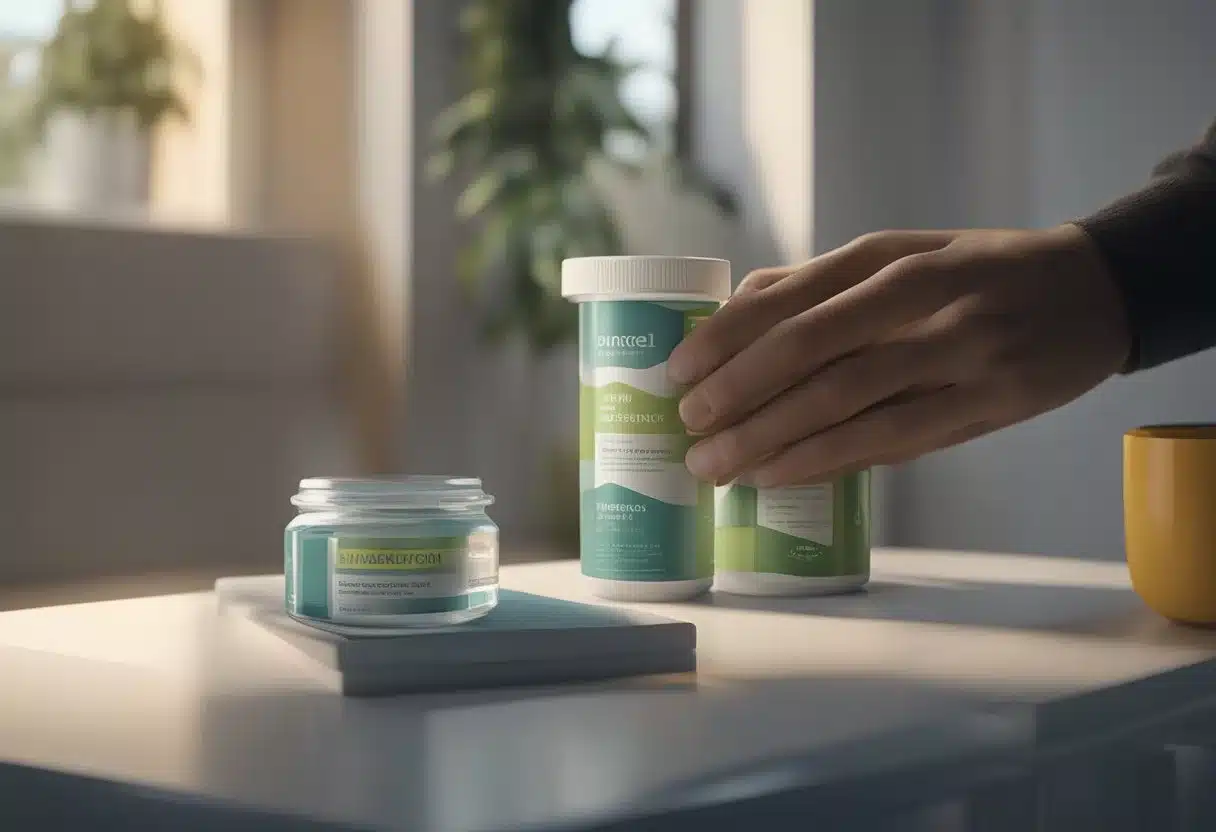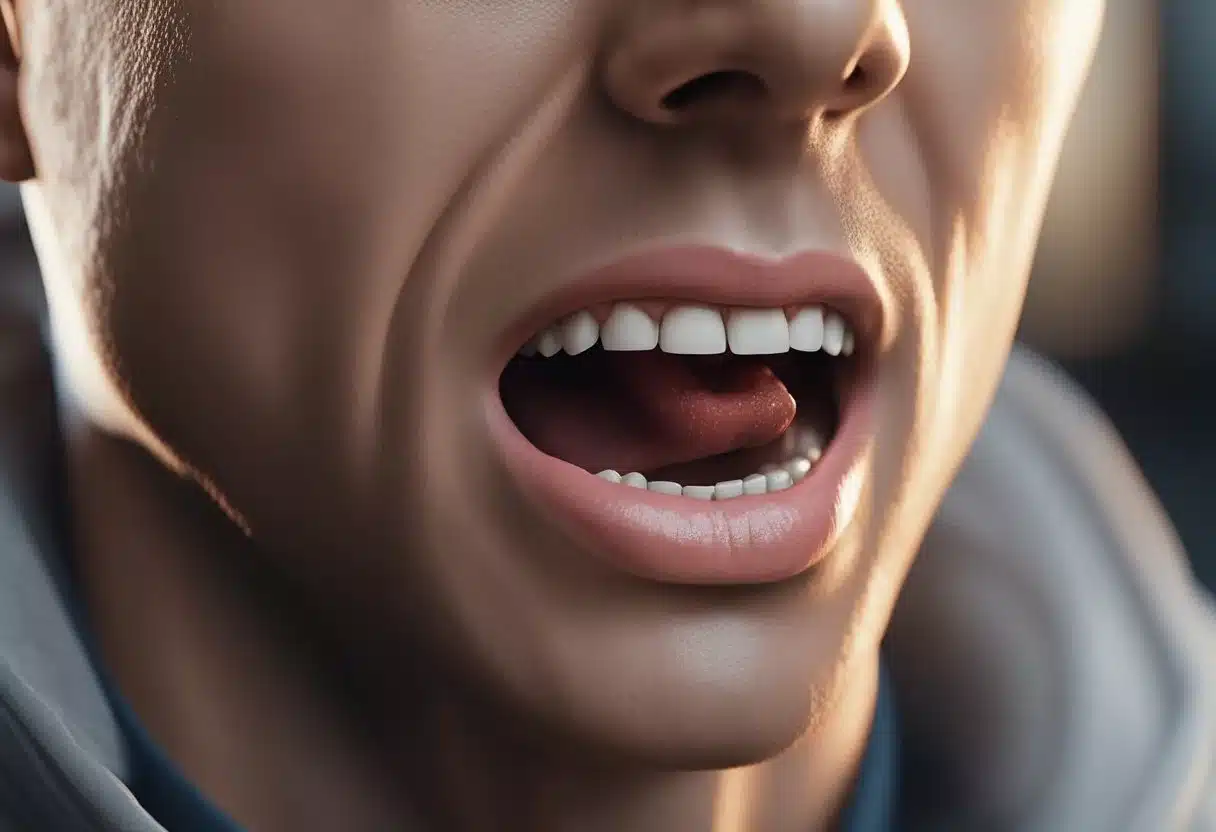Mouth sores are an uncomfortable and sometimes painful condition that many people experience. They can be caused by a variety of factors such as infections, trauma, or even certain medications. Common types of mouth sores include canker sores, which are typically round or oval with a white or yellow center and a red border.
Most mouth sores heal on their own within one to two weeks, but over-the-counter medications and home remedies can help alleviate the pain. For persistent or unusually painful sores, it’s important to seek medical advice to rule out more serious conditions. Mouth sores can significantly impact daily activities like eating, drinking, and speaking.
When dealing with recurring mouth sores or sores that don’t heal, it may be necessary to consult a healthcare professional to identify any underlying health issues. Understanding the causes and symptoms can help in managing and preventing future occurrences.
Key Takeaways
- Mouth sores often heal on their own within a few weeks.
- Persistent or painful sores need medical attention.
- Identifying underlying causes can help prevent recurrences.
Types of Mouth Sores
Mouth sores can appear on the tongue, gums, cheeks, and lips. They vary in appearance and severity. Knowing the different types can help in identifying and seeking appropriate care.
Canker Sores
Canker sores, also known as aphthous ulcers, are small, painful ulcers that usually appear on the inside of the cheeks, lips, or on the tongue. They often have a white, yellow, or grey center with a red border. Unlike cold sores, canker sores are not contagious. They can be triggered by stress, minor injuries to the mouth, acidic foods, or vitamin deficiencies. Treatment typically includes topical creams, mouth rinses, or avoiding irritating foods. These sores generally heal within one to two weeks.
Cold Sores
Cold sores, caused by the herpes simplex virus, are blisters that appear on or around the lips. These sores are highly contagious and can be spread through direct contact like kissing or sharing utensils. Before the blisters form, the affected area may itch or burn. Once they appear, cold sores usually go through several stages: blistering, oozing, crusting, and healing over 7 to 10 days. Antiviral medications and creams can reduce the severity and duration of an outbreak.
Oral Cancer
Oral cancer can manifest as persistent sores or lesions in the mouth that do not heal. These sores might appear on the tongue, gums, cheeks, or lips and can be mistaken for less serious issues. Signs include lumps, white patches (leukoplakia), or red patches that bleed easily. Oral cancer may be caused by tobacco use, heavy alcohol consumption, or human papillomavirus (HPV) infection. Early detection through regular dental check-ups is crucial for effective treatment. Treatments involve surgery, radiation, and/or chemotherapy.
Other Mouth Lesions
Other mouth lesions include conditions like oral lichen planus and thrush. Oral lichen planus presents as lacy, white patches on the mucous membranes inside the mouth, sometimes with painful sores. Thrush, caused by a yeast infection, produces creamy white lesions on the tongue, inner cheeks, or gums. Both conditions can cause discomfort and pain. Treatment for oral lichen planus includes corticosteroids and for thrush, antifungal medications are used to eliminate the infection.
Hand, Foot, and Mouth Disease
Hand, foot, and mouth disease is a viral infection that commonly affects young children. It causes painful sores in the mouth, as well as a rash on the hands and feet. The sores appear on the tongue, gums, and inside the cheeks. Symptoms include fever, sore throat, and loss of appetite. The disease is contagious and spreads through coughing, sneezing, or direct contact with contaminated surfaces. There is no specific treatment, but supportive care like hydration and pain relievers can help alleviate symptoms.
Symptoms and Diagnosis

Mouth sores can present a variety of symptoms, and it’s important to recognize these signs early. Diagnosis might require professional consultation and can reveal underlying health conditions like autoimmune diseases or infections.
Recognizing Symptoms
Mouth sores often cause pain and discomfort. They can appear as red or white patches, blisters, ulcers, or lesions inside the mouth or on the lips. These sores might have a burning or tingling sensation before they become visible.
Common symptoms include swelling, redness, and pain. Sometimes, they are accompanied by other symptoms like fever or swollen lymph nodes. The sores may be small and round, yellow or gray in color.
Consulting a Healthcare Professional
If mouth sores persist, it’s crucial to consult a dentist or doctor. A healthcare professional can perform a physical exam and may suggest a biopsy to determine the cause. They might also check for infections caused by viruses like herpes simplex or HIV.
Professionals might look for immune system issues or nutrient deficiencies, such as a lack of iron, folate, or vitamins. Understanding the specific cause helps in providing the correct treatment.
Associated Health Conditions
Mouth sores can be linked to certain health conditions and infections. Autoimmune diseases like systemic lupus erythematosus, Sjogren syndrome, pemphigus vulgaris, and Behcet disease can cause recurring sores. Viral infections such as herpes simplex, shingles, and Coxsackie A virus often lead to sores in the mouth.
Bacterial infections may result in severe inflammation and painful ulcers. Stress, hormonal changes, and systemic health problems like HIV can also trigger mouth sores. Recognizing these connections is essential for effective treatment and management.
Causes and Risk Factors

Mouth sores can occur due to various reasons, including infections, nutritional deficiencies, physical irritants, and lifestyle factors. Understanding these triggers can help in managing and preventing these painful sores.
Infections and Illnesses
Infections play a significant role in the development of mouth sores. Herpes simplex virus is a common cause, leading to cold sores. Other viral infections like the flu, and bacterial infections, can also trigger sores. Fungal infections such as oral thrush present with white lesions primarily on the tongue or inner cheeks. People with a weakened immune system are more prone to these infections, which can exacerbate the appearance of mouth sores.
Nutritional Deficiencies
Deficiencies in essential nutrients contribute to the development of mouth sores. Lacking iron, folate, and vitamin B can make the mouth more susceptible. These nutrients are crucial for maintaining a healthy immune system, and their deficiency can lead to recurrent sores. Ensuring a balanced diet rich in these nutrients or taking supplements can help reduce the risk.
Physical Irritants
Physical irritants often lead to mouth sores. Braces, dentures, and accidental injuries from biting the inside of one’s cheek or burning the mouth with hot food can cause sores. Some toothpaste and mouth rinses containing sodium lauryl sulfate act as irritants, increasing the likelihood of sores. Reducing these irritants can help prevent recurrence.
Lifestyle and Environmental Factors
Lifestyle choices significantly impact the occurrence of mouth sores. High levels of stress can trigger canker sores. Harmful habits like smoking and frequent alcohol consumption can irritate the mouth lining, leading to sores. Additionally, acidic foods such as citrus fruits can exacerbate sores. Modifying these lifestyle choices can positively affect mouth health. For more details on causes and treatments, you can refer to Cleveland Clinic’s guide on mouth ulcers.
Treatment and Management

There are many methods to handle mouth sores, ranging from medical treatments to home care and preventive steps. Each approach can help alleviate pain and promote healing.
Medical Treatments
Doctors often recommend certain medications for mouth sores. One common option is topical corticosteroids, which reduce inflammation and pain. These are usually applied directly to the sore.
For more severe cases, oral medications like corticosteroids or antibiotics may be prescribed. Antibiotics are used if there is a secondary infection.
Pain relief is often achieved with over-the-counter gels or mouthwashes that numb the sore area. Prescription mouthwashes containing lidocaine can also help manage pain, making eating and drinking more comfortable.
Home Care and Remedies
Home remedies can be effective for managing mouth sores. A warm saltwater rinse is a common solution. Swishing this in the mouth several times a day helps cleanse the area and reduce bacteria.
Another remedy is a baking soda rinse. Baking soda can decrease acidity in the mouth and reduce swelling. Applying ice to the sore can also help numb the pain.
Milk of magnesia, applied several times a day, can soothe the sore. Maintaining good oral hygiene by brushing and flossing carefully can also prevent further irritation.
Prevention Strategies
Preventing mouth sores involves good oral hygiene and certain dietary adjustments. Regular brushing and flossing are essential. Using a soft-bristled toothbrush can prevent injuries to the gums and inner cheeks.
Avoiding acidic, spicy, or abrasive foods can help prevent irritation that leads to sores. Drinking plenty of water and keeping the mouth hydrated is also important.
Using anti-inflammatory mouthwashes can prevent infections and inflammation. Managing stress through relaxation techniques can reduce the likelihood of developing stress-related sores. By following these strategies, mouth sores can be minimized or avoided altogether.
When to See a Professional

Mouth sores can often be treated at home, but there are times when seeing a professional is important.
Seek medical help if:
- Persistent Sores: If the sores last longer than two weeks, it might be more than just a minor irritation.
- Severe Pain: High levels of pain that interfere with eating or speaking need professional attention.
- Frequent Recurrences: Reoccurring sores may indicate an underlying health issue.
Possible conditions that require professional help:
- Lichen Planus: This condition causes lacy white patches or red swollen tissues in the mouth.
- Thrush: An infection caused by the Candida fungus, leading to creamy white lesions.
- Cancerous or Precancerous Lesions: Any irregular or painful sore should be checked to rule out serious conditions like oral cancer.
Professionals to consult:
- Doctors: They can diagnose systemic health issues related to mouth sores.
- Dentists: Dentists are skilled in identifying oral health problems and can provide specific treatments.
Diagnostic Tools:
- Biopsy: In some cases, a small sample of tissue may be taken for further examination to determine the cause of persistent sores.
Early intervention and proper diagnosis are key to managing mouth sores effectively. Don’t hesitate to reach out to a healthcare provider if you notice any of these signs.
Complications and Prognosis

Mouth sores can lead to various complications, and their healing process can vary depending on the underlying cause and individual health conditions.
Possible Complications
Mouth sores can sometimes lead to bacterial or fungal infections. When sores are not properly treated, they might become infected, causing increased pain and swelling.
Autoimmune diseases such as Crohn’s disease or lupus may result in recurring mouth sores. These conditions can weaken the immune system, making it harder for the body to heal and increasing the risk of infections.
Left untreated, some mouth sores can develop into oral cancer. Persistent sores that don’t heal within a few weeks should be evaluated by a healthcare provider to rule out serious conditions.
Additionally, trauma-related sores from braces or dentures can lead to chronic irritation and potential infection if the source of the trauma isn’t addressed.
Outlook and Healing
Most mouth sores heal on their own within one to two weeks. Proper oral hygiene and avoiding irritants can help speed up recovery.
For those with underlying health conditions, such as autoimmune diseases, healing might take longer and sores might recur frequently. Treatment might include topical medications to reduce pain and prevent infections.
Herpes simplex virus-related cold sores typically last one to two weeks but can be managed with antiviral medications. These medications can shorten outbreak duration and reduce frequency of future outbreaks.
Stress and hormonal changes can also impact healing times, so managing these factors can be crucial for faster recovery. Adopting a healthy lifestyle that includes a balanced diet and regular exercise can support the healing process and prevent recurrence.
Lifestyle and Home Management

Managing mouth sores involves addressing diet, stress levels, and maintaining a healthy oral hygiene routine. It’s important to make targeted changes to improve symptoms and prevent future outbreaks.
Nutritional Considerations
Diet plays a significant role in the management of mouth sores. Certain foods, like citrus fruits and spicy dishes, can irritate sores, so it’s best to avoid them. Iron, folate, and vitamin B are essential nutrients for oral health. A balanced diet rich in these vitamins can aid in healing.
Eating soft foods, like yogurt and applesauce, minimizes discomfort. Drinking plenty of water keeps the mouth hydrated and aids in the healing process. Reducing alcohol and avoiding smoking can also improve symptom relief, as these can further irritate mouth tissues.
Stress and Oral Health
Stress can trigger mouth sores. Relaxation techniques such as deep breathing, yoga, and meditation can reduce stress levels. Maintaining a regular sleep schedule ensures that the body gets enough rest, which is crucial for fast healing.
Exercise is another effective way to manage stress, as it releases endorphins that boost mood. Reducing stress can decrease the frequency of flare-ups, as emotional stress has been linked to a weakened immune system, making individuals more susceptible to mouth sores.
Oral Hygiene Practices
Good oral hygiene is key to preventing and managing mouth sores. Brushing twice a day with a soft-bristled toothbrush minimizes irritation. Using fluoride toothpaste can support overall tooth and gum health.
Regular flossing removes food particles and reduces the risk of bacterial buildup. Rinsing with saltwater or baking soda solution (1 teaspoon of baking soda in a cup of water) can help to alleviate pain and eliminate bacteria. Non-alcoholic mouthwash options can also be beneficial, as they help maintain a clean and bacteria-free mouth environment.
Understanding Recurrence
Mouth sores, or canker sores, often recur due to various triggers and underlying conditions. Stress is a significant factor. High stress levels can weaken the immune system, making the body more prone to outbreaks.
Age: Many people experience their first episode of mouth sores in childhood. These sores often continue to recur throughout adulthood.
Factors Influencing Recurrence:
- Immune System: A weakened immune system can make a person more susceptible to recurrent mouth sores.
- Diet: Certain foods can trigger sores. For example, spicy, acidic, or salty foods might cause irritation.
- Hormonal Changes: Hormonal shifts, particularly in women, can lead to more frequent outbreaks.
Viral and Bacterial Influences:
- Herpes Simplex Virus (HSV): Though not the same as canker sores, cold sores caused by HSV can sometimes be mistaken for recurrent mouth sores.
- Bacteria: Infections from dental issues can contribute to the recurrence of ulcers.
Preventive measures can help manage and reduce the frequency of mouth sores:
- Avoiding Triggers: Identifying and avoiding foods that cause irritation.
- Stress Management: Techniques such as meditation or exercise can help reduce stress levels.
- Good Oral Hygiene: Regular brushing and flossing to prevent bacterial infections in the mouth.
Linking comprehensive information on mouth sores can be found at Merck Manual’s guide on Recurrent Aphthous Stomatitis.
Support and Resources
Support Groups
Support groups can be a valuable resource for people dealing with recurring mouth sores. These groups provide emotional support and practical advice on how to manage pain and discomfort. Connecting with others who have similar experiences can help reduce feelings of isolation.
Health Conditions
Certain health conditions like Crohn’s disease and lupus can increase the likelihood of mouth sores. It is important to consult a doctor to determine if an underlying condition might be contributing to the problem. Medication and treatment plans for these conditions can also help reduce the occurrence of sores.
Doctor
Regular check-ups with a healthcare provider are essential for diagnosing and managing mouth sores. A doctor can offer prescriptions for medications that help reduce pain and promote healing. They can also identify any underlying health issues that could be triggering the sores.
Dentist
Visiting a dentist can also provide relief. Dentists can give specialized mouth rinses and suggest treatments for oral hygiene that might reduce the incidence of sores. They can also check for dental issues like sharp teeth or braces that could be contributing to the problem.
Information
Reliable information on mouth sores can be found through websites like the Cleveland Clinic and Verywell Health. These sites offer detailed guides on causes, symptoms, and treatments. Print materials from organizations like the American Cancer Society can also provide helpful advice on managing mouth sores.
By leveraging these resources, individuals can find effective ways to manage and reduce the occurrence of mouth sores.
Research and Future Directions

Researchers are focusing on new treatments for mouth sores, particularly for those caused by chemotherapy. These ulcers are often more widespread and severe, appearing within two weeks of treatment.
Key areas of research include:
- Mechanisms of Ulcer Formation: Understanding how mouth ulcers form can help in developing better treatments.
- Use of Herbal Remedies: Exploring natural treatments like honey and aloe vera.
- Gene Therapy: Investigating the potential of gene editing to prevent ulcers.
Studies have also found that mouth rinses with salt water or baking soda can be effective in managing pain. Mayo Clinic recommends using these methods along with milk of magnesia and avoiding acidic or spicy foods.
Developments in nanotechnology are promising. Nanoparticles may be used to deliver drugs directly to the ulcer, reducing side effects. Stem cell research is another area showing potential, particularly in regenerating damaged oral tissues.
Clinical trials are ongoing for new medications that can prevent or reduce the severity of mouth ulcers caused by viral infections, such as those caused by the herpes simplex virus. These treatments aim to reduce pain and speed up healing.
These advancements suggest a future with more effective and targeted treatments for mouth sores, improving the quality of life for those affected.
Conclusion
Mouth sores can have various causes, including viral infections, autoimmune conditions, and physical trauma. Common types of mouth sores include canker sores, cold sores, and sores from injuries like biting the inside of the mouth.
Canker sores are usually small and painful and often heal on their own within one to two weeks. Treatments, such as saltwater rinses, can help speed up the healing process.
Cold sores, caused by the herpes simplex virus, are contagious and usually appear on or around the lips. Over-the-counter treatments can help reduce symptoms and shorten the duration of outbreaks.
Certain conditions like Crohn’s disease and lupus can lead to mouth sores. Managing these underlying conditions often helps reduce the occurrence of sores.
Preventive measures include:
- Maintaining good oral hygiene
- Avoiding foods that can trigger sores
- Using protective gear during sports
For more information, you can read about mouth sores and their causes or explore treatment options.
Regular dental check-ups and a healthy diet contribute to overall oral health, helping to prevent the occurrence of mouth sores. Seeking medical advice when sores are persistent or unusually severe is important.
Frequently Asked Questions

Mouth sores can be painful and bothersome, but there are various treatments and remedies available. This section covers effective treatments, natural remedies, identifying stress-related sores, and distinguishing mouth ulcers from cancer.
What are the most effective treatments for mouth sores?
Over-the-counter treatments like gels, creams, and mouth rinses can help reduce pain and speed up healing. Medications such as corticosteroids may also be prescribed for severe cases.
How can mouth ulcers be cured quickly using natural remedies?
Saltwater rinses and baking soda pastes are common home remedies. Aloe vera and honey can also help soothe and heal the sores. Consuming yogurt may help due to its probiotic content.
What are the distinguishing features between mouth ulcers and cancer?
Mouth ulcers tend to be painful, smaller, and disappear within two weeks. Cancerous sores are often larger, more persistent, and painless. Any sore that does not heal within three weeks should be checked by a doctor. Learn more about the differences from the Mayo Clinic.
What are the primary causes of mouth sores?
Various factors like minor injuries, stress, hormonal changes, and certain health conditions can cause mouth sores. Vitamin deficiencies and food sensitivities are also common triggers. For specific causes and more information, check out the Cleveland Clinic.
What remedies are available for rapid relief from mouth sores?
Applying ice to the sore and using pain-relief gels can provide quick relief. Mouth rinses with saltwater or hydrogen peroxide may also reduce discomfort. Additionally, avoiding spicy and acidic foods can prevent irritation.
How are stress-related mouth sores identified and managed?
Stress-related sores may occur more frequently during periods of high stress. Management includes reducing stress through relaxation techniques and using prescribed medications if needed. Eating a balanced diet and getting enough sleep can also help.